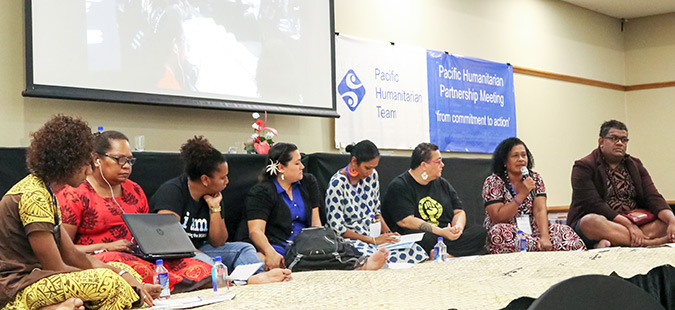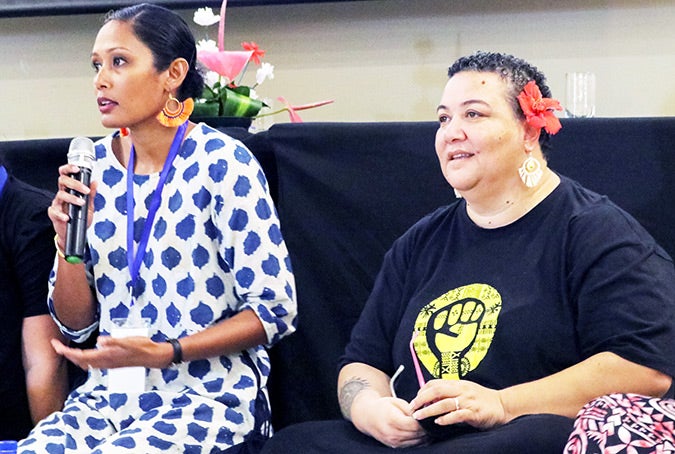Diverse and Local Humanitarians Essential for Disaster Preparedness and Response
Date:

Suva, Fiji — “Humanitarian preparedness and response must include the voices and action of all in society, to ensure that humanitarian assistance is just, inclusive, safe and dignified,” said Noelene Nabulivou, political advisor of Diverse Voices for Action and Equality (DIVA for Equality).

A sharing circle facilitated by DIVA for Equality and UN Women provided an intimate and grounded space for perspectives on gender equality and human rights from diverse and local humanitarians at the Pacific Humanitarian Partnership (PHP) meeting today in Suva.
Experiences were shared by national civil society members from across the Pacific region including FemLINKPacific/Transcend Oceania, Pacific Rainbows Advocacy Network (PRAN), Fiji Disabled Peoples Federation (FDPF), Women United Together Marshall Islands (WUTMI) and DIVA for Equality.
“We are human rights defenders, but with limited resources – we are doing the work out of passion and we sacrifice time with family, who are themselves being affected during a disaster,” said Viva Tatawaqa, management collective member of DIVA for Equality.
“We are in the field supporting affected people from the most poor and marginalised communities,” added Ms Tatawaqa.
The Pacific Humanitarian Partnership (PHP) Meeting being held on 2-3 October in Fiji seeks to bring together the humanitarian community – including government, UN agencies, civil society organisations, social movements and international and national non-government organisations (INGOs and NGOs) - to share best practices and strengthen localization of preparedness and response activities.

“Now, it’s a top to bottom approach – but at the community level, we are already ‘localised’ and we just need to enhance the system in place without introducing a new system, ” said Bonita Qio, coordinator of PRAN - an organisation based in Lautoka for women of diverse sexual orientation, gender identity and expression including transwomen and sex workers.
“We don’t want to only focus on learning from past experiences – we want to be better prepared, with a plan to ensure we use our local knowledge to be resilient going forward,” added Ms Qio.
Following Tropical Cyclone (TC) Winston, Ms Qio conducted outreach for members of the lesbian, gay, bisexual, transsexual, transgender, gender non-conforming and intersex (LGBTQI) communities, assisted with Fiji Red Cross field assessments and supported femLINKpacific’s Women’s Weather Watch, which is the main source of information on disasters that can be accessed and understood by women in rural communities.
Lanieta Tuimabu, Office Manager for Fiji Disabled Peoples Federation (FDPF), speaking about TC Winston said “through the clusters, we were able to push – we had a lack of manpower and our [disability] issues were not coming up so strong – but clusters listened to us, that was a platform we could use to advocate in.”
Ms Tuimabu added “we worked through the formal structure with data and assessments – we came up with our own set of questions, and from this info collected came the dignity packs.”
There is a need to pre-position key supplies for people with disabilities to avoid delays in distributing dignity packs as “quality and safe [medical] products and mobility devices - needed to avoid complications and not cause issues - are not available locally,” said Ms Tuimabu.
Isikeli Tumaiwakaya Vulavou of Rainbow Pride Foundation was also involved in the TC Winston response and recovery - collecting stories from LGBTQI community members affected by the disaster.“We want [humanitarian agencies] to think within the SOGIESC [sexual orientation, gender identity and expression and sex characteristics] Framework during a disaster so that people with diverse sexual and gender identities are not left out”, added Mx Vulavou.
Mx Vulavou noted that “there has been interest by humanitarian actors, but a lack of global guidelines on how to engage.”
Naeemah Khan, Gender and Humanitarian Analyst with UN Women, said “these people on the mat are doing humanitarian work at great expense to them personally – their organisations don’t have big budgets and they can be out in the field for 2-3 weeks at a time during disasters.”
“Localisation needs to consider how we can better support local humanitarian actors and civil society organisations with core funding so they can continue to do this critical work and not only to survive, but thrive,” added Ms Khan.
In line with the 2016 World Humanitarian Summit (WHS) commitments, the PHP meeting aims to have greater collaboration in disaster preparedness and response between governments and international humanitarian partners and civil society organisations.
UN Women is taking its WHS commitments on gender and localization seriously in ensuring funding reaches local actors including feminist, women-led and LGBTQI-led civil society groups, strengthening shared skills for effective implementation of funding and ensuring the needs of women and Pacific communities, in all their diversities, are met.
Additionally, UN Women is providing leadership to the regional Pacific Humanitarian Protection Cluster, bringing together UN agencies, regional organizations, NGOs and INGOs to coordinate protection preparedness and response across the Pacific. Leading the cluster is a first for UN Women globally and an opportunity to ensure that women - as well as children, people with disabilities, LGBTQI communities and displaced people - are equal participants in planning and responding to natural disasters.
Media enquiries should be directed to:
Terri O’Quinn, Humanitarian Communications Officer, UN Women MCO Fiji, Ph: +679 330 1178 ext. 108 or Email: terri-ann.oquinn@unwomen.org
Noelene Nabulivou, Political Adviser, DIVA for Equality, Fiji, Email: noelenen@gmail.com
For further information:
http://fiji.unwomen.org
http://www.facebook.com/unwomenpacific
http://www.twitter.com/unwomenpacific
http://www.divafiji.com
http://www.facebook.com/DIVAFiji
http://www.twitter.com/diva4equality
http://diva4equality.wordpress.com
BACKGROUND INFORMATION:
UN Women Fiji Multi-Country Office (MCO)
The United Nations Entity for Gender Equality and the Empowerment of Women (UN Women) was created at the July 2010 United Nations General Assembly. A global champion for women and girls, UN Women was established to accelerate progress on meeting their needs worldwide. The MCO covers 14 Pacific Island Countries and Territories (PICTs): Cook Islands, Federated States of Micronesia, Fiji, Kiribati, Nauru, Niue, Palau, Republic of Marshall Islands, Samoa, Solomon Islands, Tokelau, Tonga, Tuvalu and Vanuatu. The Fiji MCO works to progress gender equality and women’s empowerment in the Pacific through four key programmes: Women’s Economic Empowerment; Ending Violence Against Women; Political Participation, Leadership and Human Rights; and Gender and Protection in Humanitarian Action.
DIVA for Equality
Diverse Voices for Action and Equality (DIVA for Equality) concentrates its work in urban poor communities, rural and remote constituencies, and with women and people with diverse sexual orientation, gender identity and expression, as well as wider women-led social organising in Pacific small island states. DIVA for Equality co-convenes a regional Gender, Climate change and Sustainable development coalition (PPGCCSD), We Rise Coalition (with femlinkPACIFIC, FWRM and IWDA); the Pacific Feminist SRHR Coalition and is a founder/on the Working Group of new Pacific CSO Engagement Mechanism (PACCOM), etc. DIVA for Equality is also the Women's Major Group PSIDS Organizing Partner (2017-2019) and the Women and Gender Constituency (WGC) Liaison to the UNFCCC COP23 Presidency.
World Humanitarian Summit
The World Humanitarian Summit – held in Istanbul, Turkey in May 2016 – was a pivotal moment for the global humanitarian agenda. At the Summit, representatives from 173 Member States of the United Nations, over 700 local and international NGOs, the private sector and other stakeholders took important steps to advance global action on some of the greatest humanitarian issues of our time. It generated momentum and political determination to move forward on the UN Secretary-General’s Agenda for Humanity and its five core responsibilities, to deliver better for people across the globe. In the lead, up to the Summit, the WHS Pacific consultations involved a wide range of stakeholders and highlighted five key messages, forming a roadmap for the future of humanitarian action in the region. These called for a new regional approach; placing affected people at the centre of humanitarian action, realigning the humanitarian system to build on local capacities, planning for and managing disaster and climate change displacement, collaborating better for resilience, and making financing more flexible and predictable to cover preparedness, response and recovery.